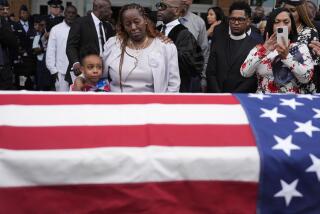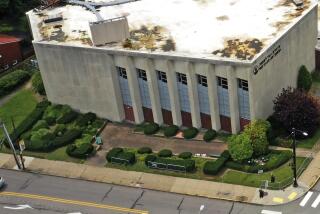Attack on Missionaries Called God’s Will
- Share via
While two governments struggled over blame in the gunning down of a plane flying American evangelists over the jungles of Peru, the friends and relatives of a slain missionary already had their answer. It was God’s will, they said--with the same devout assuredness that led Veronica “Roni” Bowers on her final flight.
Even the wounded pilot, whose foot was nearly severed by a machine gun blast but who managed to land the crippled hydroplane in a river, insisted Monday that the incident was guided by divine hand.
“It certainly is no credit to me,” Kevin Donaldson said in a brief statement from the hospital in Reading, Pa., where his shattered foot was being treated. “It was obviously the Lord that landed the aircraft.”
Some who knew Bowers--and had watched her recent joy over the adoption of her 7-month-old daughter, Charity, who died along with her in the attack Friday by the Peruvian jet--said they remain baffled by the gaps in official explanations offered by the U.S. and Peruvian governments.
Despite the conflicting accounts, many who knew Bowers and her husband, 37-year-old James Bowers, said they already were finding acceptance in a tragedy that promised no immediate peace.
“They knew a drug war was going on, but they weren’t concerned because they figured they were in the Lord’s hands, and he would take care of them,” Grace Zandstra, the slain woman’s aunt, said Monday from her home in Muskegon, Mich.
However, others close to Roni Bowers strained to understand how the Baptist missionary plane her family rode in could have been mistaken for a drug-smuggling craft, shot down apparently without warning. Managing a water landing, Donaldson reported that the evangelists’ plane was strafed while he, missionary James Bowers and the Bowers’ 6-year-old son, Cory--tried to keep from drowning.
Peruvian authorities said the missionaries’ plane had not filed a flight plan--suggesting that that might have led a government fighter pilot to mistake the small craft for a smuggler’s plane. The U.S. has acknowledged that a CIA spotter plane was involved in the chain of events that led to the missionary craft’s erroneous identification.
Michael Loftis, president of the Assn. of Baptists for World Evangelism--the organization that funded and supervised the mission--insisted in televised reports Monday that Donaldson had “filed a flight plan as standard operating procedure. . . . It was a very familiar and routine fly route.”
Michael Dudley, who grew up on the Virginia coast with 35-year-old Roni Bowers, also expressed skepticism about the governments’ versions of events. He wondered aloud whether the Peruvian fighter jet might have been ordered to fire on the missionaries because of their work with Indian tribes.
“How could they not know who they were? Roni and Jim had been working in that area for years, using that plane for years,” said Dudley, a real estate broker in Fredericksburg. “I feel like there’s no way the fighter pilots could have mistaken them for drug traffickers. It’s absurd.”
Dudley insisted that some “governments don’t want Christians to teach people about God and all the freedom he can bring. They have people so tightly controlled in some of these places, they’re scared of missionary work.”
James Bowers, who was detained and interrogated by Peruvian authorities before he returned with his son to his brother’s home near Raleigh, N.C., said Monday that he was “thankful” for both countries’ efforts to “investigate why this tragedy occurred.”
Speaking through the Assn. of Baptists for World Evangelism--his missionary group based in New Carrollton, Pa.--Bowers expressed concern both for his wife’s family and for “our Peruvian friends.” However, he declined to speak in detail about the incident until his wife’s funeral, scheduled for Friday in her hometown of Muskegon.
Zandstra--whose daughter attends Calvary Church, the Muskegon chapel that sponsored the Bowers’ missionary work--said Roni and her husband understood the dangers they risked on every sortie into the river country of Peru.
“The missionary’s life was their life’s work,” Zandstra said.
She and others who had listened to the couple’s elated tales of missionary work in Peru and pored over their prized photographs agreed that the risks were worth it.
“She knew exactly what she wanted. And when she died, she was doing it,” said Roni Bowers’ brother, Garnett Luttig. His sister, he said, “was following her dreams.”
When the couple returned in November to adopt Charity, Luttig and Zandstra both said, they were overjoyed--but equally eager to return to their work in Peru. “We saw them last Christmas, and they couldn’t wait to get back,” the aunt said.
“They had no concerns, and we didn’t either,” Zandstra said. “This was their work, and they believed in it.”
So did Donaldson, 42, who now faces a long, tricky convalescence. Doctors expressed amazement Monday that he had managed to bring the damaged plane down to a river landing.
“The only thing holding his foot on was his skin and some muscles,” said Dr. James A. Coffey, a neurosurgeon at Reading Hospital and Medical Center, where Donaldson was transferred Sunday night. “Any controls that required the use of his right leg, he was unable to do.”
A machine gun bullet fired by the Peruvian fighter tore through the plane and Donaldson’s leg, severing two arteries and nearly blowing his foot off, Coffey said.
Doctors in Lima stabilized the wound, Coffey said, but the long period after the shooting and exposure to bacteria in the river made it impossible for physicians to sew the wound back up. Donaldson is still at risk, Coffey said, to “a high chance of infection.”
Donaldson said he was “glad to be alive. But I’m also deeply hurting for the loss of my friend and colleague.”
It was pain that all of the slain woman’s friends understood, an ache that they said could be relieved only by prayer.
“It was heart-wrenching what happened to Roni and her baby. But it’s like one of those woven latch rugs,” said Steve Aholt, a missionary pilot who trained at Piedmont Baptist College in Winston-Salem, N.C., with the couple. “On the bottom, it’s a mess. I don’t know why this happened. But when you look at it from the top, from God’s perspective, we have to believe there is a beautiful design.”
More to Read
Sign up for Essential California
The most important California stories and recommendations in your inbox every morning.
You may occasionally receive promotional content from the Los Angeles Times.













